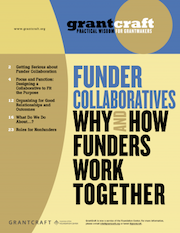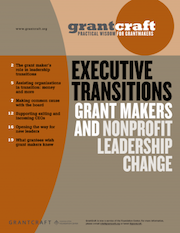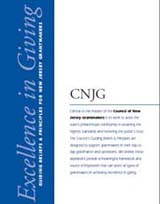Site Search
- resource provided by the Forum Network Knowledgebase.
Search Tip: Search with " " to find exact matches.
These guides are designed to help foundations consider how more diverse and inclusive practices might advance their mission by making their work more effective and more reflective of communities served. By highlighting 10 ways foundations can approach...

In this guide, contributors share strategies for structuring a collaborative to fit its purpose, building strong relationships and resolving conflicts, and figuring out if the collaborative you're in is working. Contributors also offer ample proof...
A User's Guide to Advocacy Evaluation Planning was developed for advocates, evaluators, and funders who want guidance on how to evaluate advocacy and policy change efforts. This tool takes users through four basic steps that generate the core elements...
To answer the basic question of how many active family foundations are planning to spend down or exist in perpetuity (or have not yet made a decision), and to examine foundations’ motivations and decision-making, the Foundation Center, in...
There are many ways to start a giving circle. These 10 steps can give you a starting point and a basic roadmap.
Step One - Set Goals and Structure
Bring your group together for a first meeting. Take time at this first meeting to discuss...
A focus on racial equity can increase your effectiveness at every stage of the grant making process. Explores how a racial equity lens can help you scan your field or community, cultivate new leaders, encourage creative approaches, and nourish change...
What would good foundation practice with solid evaluative inquiry at its core look like? Find out how your foundation can rethink the role of evaluation and turn it into a vital institutional tool.

What can grantmaker do to help their grantees manage executive transitions more effectively? Get tips and best practices from Grantcraft.
Find a collection of resources on the how-tos of building your organization's budget.
A sample document detailing the core values of the Betty and Davis Fitzgerald Foundation including restrictions on participation on nonprofit/grantee boards.
An overview on the self-dealing law, including definitions, common problem areas, exceptions, penalties, and resources.
ASAE & The Center for Association Leadership's landmark study and publication 7 Measures of Success identified the ability to build...
Sample board committee descriptions, including roles and responsibilities of committee members
CNJG Member survey ranking which issues are most important to them.

This includes insights and tips related to board governance, legal compliance, grantee communications, fiscal responsibility, public disclosure, and many other key areas of foundation governance and operations. It is intended to serve as a practical...
This tool for unstaffed foundations includes an accountability self-assessment and a legal checklist. It is divided into nine topic sections, each of which is divided into three levels, which can help foundations tailor the tool to meet their specific...
What does effectiveness mean to foundations? Explore definitions, challenges, and tips for evaluating foundation effectiveness.
Sample conflict of interest policy, as outlined by the Internal Revenue Service.
PolicyWorks for Philanthropy is a multi-year initiative that seeks to build the capacity of regional associations of grantmakers’ staff, board and volunteer leaders to engage policymakers. Our vision is that...

